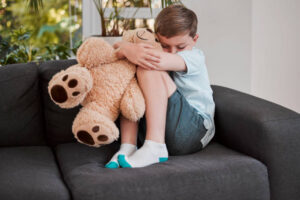Anxiety
Anxiety can be experienced by PSP families for many reasons due to dangers which are part of the job. There is often the fear of injury or death associated with these dangers. Media reports of serious incidents and fatalities can increase feelings of anxiety for both adults and children. PSP are at higher risk of both psychological and physical injuries than the general public. This increased risk of injury and the harmful effects of events and situations create stress for both PSP and their families. This anxiety, stress, and tension can spill over into family life due to uncertainty about the PSP’s safety on the job. Physical injuries can have short- and long-term impacts on families. Families also worry about exposure to trauma which can affect mental health and family relationships. Worry is natural and unavoidable for most families. Families can support the wellbeing of family members by being aware of the effects and managing them in healthy ways.
What “fuels” worry and fear?
Please attempt this activity first, then read about the topic.
While many situations can “fuel” worry, everyone is unique. We all experience worry differently. PSP families have identified key factors that can shape anxiety.
Try: Skill-building Exercises
Need Something More?
Check out our self-directed Spouse or Significant Other Wellbeing Course.
References for this page (click to expand)
Alrutz, A. S., Buetow, S., Cameron, L. D., & Huggard, P. K. (2020). What happens at work comes home. Healthcare (Basel), 8(3), 350. https://doi.org/10.3390/healthcare8030350
Bochantin, J. E. (2017). Ambulance thieves, clowns, and naked grandfathers: How pses and their families use humorous communication as a sensemaking device. Management Communication Quarterly, 31(2), 278-296. https://doi.org/10.1177/0893318916687650
Cox, M., Norris, D., Cramm, H., Richmond, R., & Anderson, G. S. (2022). Public safety personnel family resilience: A narrative review. International Journal of Environmental Research and Public Health, 19(9), 5224. https://doi.org/10.3390/ijerph19095224
Helfers, R. C., Reynolds, P. D., & Scott, D. M. (2021). Being a blue blood: A phenomenological study on the lived experiences of police officers’ children. Police Quarterly, 24(2), 233-261. https://doi.org/10.1177/1098611120964954
Hoven, C. W., Duarte, C. S., Wu, P., Doan, T., Singh, N., Mandell, D. J., Bin, F., Teichman, Y., Teichman, M., Wicks, J., Musa, G., & Cohen, P. (2009). Parental exposure to mass violence and child mental health: The first responder and WTC evacuee study. Clinical Child and Family Psychology Review, 12(2), 95-112. https://doi.org/10.1007/s10567-009-0047-2
Landers, A. L., Dimitropoulos, G., Mendenhall, T. J., Kennedy, A., & Zemanek, L. (2020). Backing the blue: Trauma in law enforcement spouses and couples. Family Relations, 69(2), 308-319. https://doi.org/10.1111/fare.12393
Ricciardelli, R., Carleton, R. N., Groll, D., & Cramm, H. (2018). Qualitatively unpacking canadian public safety personnel experiences of trauma and their well-being. Canadian Journal of Criminology and Criminal Justice, 60(4), 566-577. https://doi.org/10.3138/cjccj.2017-0053.r2
Roth, S. G., & Moore, C. D. (2009). Work-family fit: The impact of emergency medical services work on the family system. Prehospital Emergency Care, 13(4), 462-468. https://doi.org/10.1080/10903120903144791
Sommerfeld, A., Wagner, S. L., Harder, H. G., & Schmidt, G. (2017). Behavioral health and firefighters: An intervention and interviews with Canadian firefighters. Journal of Loss & Trauma, 22(4), 307-324. https://doi.org/10.1080/15325024.2017.1284515

